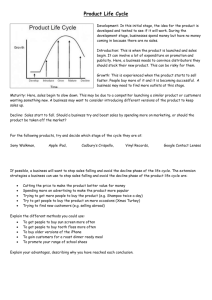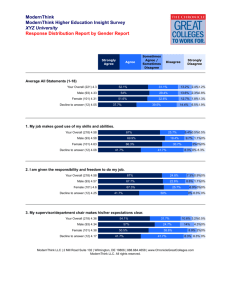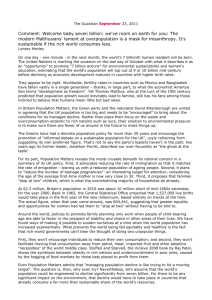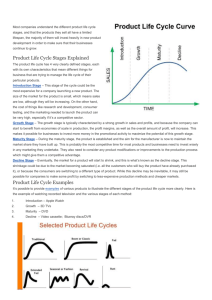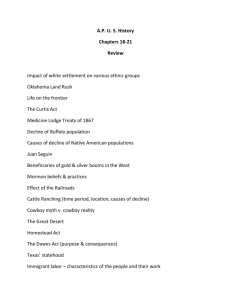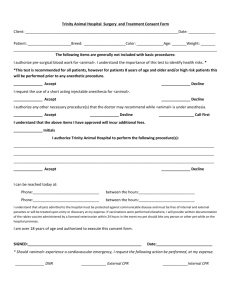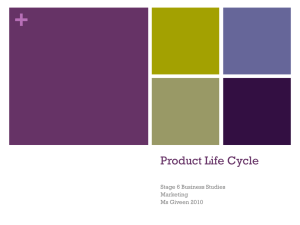plural
advertisement
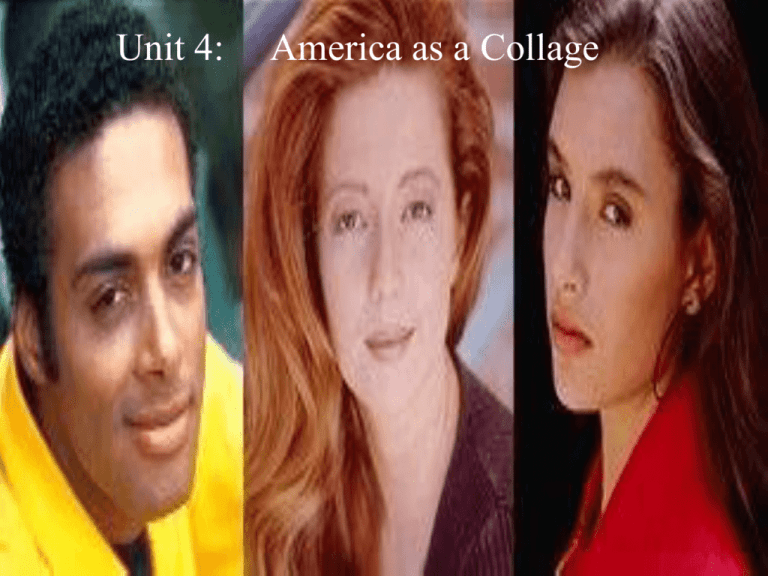
Unit 4: America as a Collage UNIT 4: AMERICA AS A COLLAGE CULTURAL BACKGROUND PRE-READING DETAILED-READING AFTER-READING Cultural Background: Map of the U.S.A. Pluralism Multiculturalism A nation of immigration Map of the USA (50 states) pluralism Pluralism refers to the acceptance of many different groups in society or many different schools of thought in an intellectual or cultural discipline. Although America’s culture is becoming more uniform, its society remains a diverse mix of ethnic, racial, and religious groups. The US is a pluralistic society, meaning it is composed of many nationalities, races, religions, and creeds. Some of the people who immigrated to America embraced the opportunity to leave old cultures behind and to remake themselves unencumbered by past traditions and and loyalties. Others found that the liberties promised under the Bill of Rights allowed for distinctiveness rather than uniformity, and they have taken pride in preserving and celebrating their origins. Many Americans find that pluralism adds to the richness and strength of the nation’s culture. Multiculturalism Multiculturalism is a concept with many meanings. But it often refers to acceptance of immigrant and minority groups as distinct communities, distinguishable from the majority population. Like bilingualism, multiculturalism provokes debate. Advocated of multiculturalism believe that members of minority groups should enjoy equal rights in American society without giving up their diverse ethnic cultures. A nation of immigration Although the US has been shaped by successive waves of immigrants, Americans have often viewed immigration as a problem. Established Americans often look down on new immigrants. The cultural habits of immigrants are frequently targets of established community. Despite such tensions,economic needs have always forced Americans to seek immigrants as laborers and settlers, and economic opportunities have beckoned foreigners. The vast majority of immigrants to the US have come in search of jobs and the chance to create a better life for themselves and their families. In all of American history, less than 10 percent of immigrants have come for political or religious reasons. I. Pre-reading 1) Listen to the recording 2 or 3 times and then think over the questions on Page 108. 2) Some questions on the text to check their comprehension. Q1: According to the author, why is America not in decline? Q2: Who bring such a culture to America? Q3: What attracts them to America? 3) Do Cloze A on P126 to get the main idea of the text. 4) Divide the text into several parts. II. Detailed Reading Part 1 Part 2 Part 3 paras 1-5 paras 6-21 paras 22-24 Part 1 L2 L4 L5 L8 L12 L14 L25 L26 L27 paras 1-5 in decline characteristic dynamism paralyze precedent sense pluralism leave behind mentality Questions for Part 1: Why is it hard to think of America in decline? What thesis does Paul Kennedy advance in his book? Does the author agree with him? Why does the author think that America will not follow historical precedent that all powerful nations declined? What is the main idea of Part1? L2 in decline in decline / on the decline: losing strength e.g. The working population is in decline. the death rate of heart disease is on the decline. In our town, interest in sports is on the decline. decline e.g. n. decline v. move from a better to a worse position, or from higher to lower e.g. His power / health / influence has begun to decline now that he is old. The old man declined rapidly and soon died. There is a sharp decline in prices / birth rate / his health / his influence / power to refuse, usu. politely; be unwilling e.g. We decline their invitation to go to the party / offer of a lift. The minister declined to make a statement to the newspapers. L4 characteristic characteristic n. e.g. a special and easily recognized quality of sb. or sth. A useful characteristic of the cat is its ability to catch and kill mice. Genes determine the characteristics of every living thing. The capacity to think is the distinctive characteristic of human beings. character n. the combination of qualities which makes a thing, event, place, etc. different from another e.g. The furniture in his apartment was pretentious and without character. This town isn’t interesting. Let’s go somewhere else with more character. feature e.g. n. a (typical or noticeable) part or quality Wet weather is a feature of life in Scotland. The island’s chief feature was its beauty. L5 dynamism dynamism n. (in a person) the quality of being dynamic dynamic a. (of people, ideas,etc.) full of or producing power and activity e.g. a dynamic person / a dynamic period in history dynamics n. the science that deals with matter in movement L8 paralyze paralyze / se v. to cause (some or all of the body muscles) to become uncontrollable e.g. A stroke paralyzed half his face. He is paralyzed from the waist down. v. to make ineffective; cause to stop working e.g. The electricity failure paralyzed the train service. The city was paralyzed by general strikes. paralysis / ses n. e.g. He is suffering from paralysis of the lower limbs / the arm. paralysis of industry by strikes L12 precedent precedent n. earlier happening, decisions or customs used as a guide / an example or rule; present / future actions e.g. The Supreme Court has already set a precedent for dealing with similar cases. Don’t take / use this as a precedent for disobeying me again. The appointment of female CEO in the company is without precedent. precede v. e.g. A precedes B in the alphabet. She preceded him across the street. The eldest prince precedes all men except the King. precedence/cy n. e.g. Ladies shall have the precedence. A recent poll reported that people gave precedence to the control of inflation. L14 have a / the sense that e.g. feel /believe/ realize that I have a sense that something is wrong with my car. to bring sb. to his senses e.g. have a sense They threw cold water on his face to bring him to senses. Time will bring you to your senses. (understand) to come to one’s senses e.g. She soon came to her senses in hospital. Don’t act so foolishly. Come to your senses. in all senses / in every sense e.g. in no sense e.g. The election was in every sense fair. His mind is in no sense brilliant. make sense e.g. A sentence must make sense. What he said doesn’t make sense. L25 pluralism pluralism n. the principle that people of different races, religions, and political beliefs can live together peacefully in the same society e.g. plural e.g. political pluralism / ideological pluralism a. involving more than one person or thing a plural ending / citizenship / system of education singular opp. e.g. “Electronics” is plural in form but takes a singular verb. L26 leave behind leave behind leave about / around fail or forget to take or bring e.g. It’s a fine day. You can leave your umbrella behind. He went off in a hurry and left behind his key. abandon, discard e.g. In their withdrawal, much of the heavy equipment had to be left behind. e.g. The child left toys about. leave alone e.g. He is busy. We’d better leave him alone. / Leave the puppy alone. leave go / hold of e.g. Leave go of my hair. (stop holding) leave off leave out leave over e.g. It’s time to leave off work. e.g. Nobody speaks to him; he’s always left out. e.g. We’ll leave this pie over for tomorrow. L27 mentality mentality the abilities and powers of the mind e.g. a man of average / high / weak mentality She was so paralyzed with fear that her mentality went to pieces. characteristic attitude of mind; way of thinking e.g. I can’t understand the mentality of anyone who likes to watch. Don’t have the try-your-luck mentality. Part 2 Section 3 L76 facility Paras 11 –14 Section 2 L56 Paras 6 – 10 Section 1 L37 paras 6-21 Section 4 ultra Paras 15 –16 constructive Paras 17 – 21 L86 possibility L95 offend L102 prospective L86 conception L100 sense L102 submerge Questions for part 2 What is the characteristic of the city Los Angeles? / In what way is the city Los Angeles different from other cities? (Section1) What can you infer from the example of a PC company in Orange County? (Section2) What is the difference in the relations between developed and underdeveloped worlds now and before? (Section3) Who was Jose Vasconcelos? What did he write about in the book mentioned in this section? (Section4) L37 facility facility ability to do or perform sth. easily e.g. He has great facility in learning languages. She plays the piano with facility. Practice gives a wonderful facility. L56 ultra- ultra prefix beyond; very e.g. ultra clean / cold / critical / fashionable / fast / high / modern an ultrafast computer / ultrahigh skyscrapers / an ultramodern automobile ultraconservatism / ultraism / ultraist / ultra rightist (leftist) / ultranationalist supergreater or more than usual e.g. the superpowers / market / man / nature / speed / star L76 constructive constructive a. serving a useful purposes; helping to improve or develop sth; helpful e.g. John made a number of very constructive suggestions at the meeting. Criticism is welcome only when it is constructive criticism. constructive response / use of one’s leisure time construct v. e.g. construct a ship / a road / a bridge / a budget construction n. e.g. a construction site / ship construction / capital construction / socialist construction L86 possibility possibility (often pl.) power of developing, growing, or being useful in the future e.g. He is a man of possibilities. (prospective) The house is in bad condition, but it has possibilities if it’s properly repaired. L86 conception conception general understanding, idea e.g. Different people have different conceptions of what love is. Having studied history, I have some / a / a clear conception of what life was like in the past. I have no conception (of) what he means / why he left home. the act of forming an idea, plan, etc. e.g. At the moment of its conception, every detail of a great musical work would become clear in Mozart’s mind. concept a general idea, thought, or understanding e.g. He speaks in concepts rather than specifics. new concept furniture / a concept car L95 offend e.g. offend v. hurt the feelings of His words/ rudeness offended many people. He was deeply offended at their refusal to come / that they refused to come. cause displeasure e.g. The smell offended him. Cruelty offends many people. Some music offends, rather than pleases the ear. offence / se n. e.g. One cannot hear such a remark without offence. offensive a. e.g. offensive behavior / remarks / sight / odour The advertisements were offensive to women. L100 sense in the sense as far as … is concerned e.g. In the academic sense, this article is not well written. In the environmental sense, the plan to build a chemical factory is a disaster. in a / one sense in one way of speaking, partly e.g. You are right in a sense, but you don’t know all the facts. L102 perspective n. perspective e.g. the way in which a matter is judged, view He tends to view most issues from a religious perspective. The novel Harry Potter is written from the perspective of a child. This report may have given me a distorted perspective. L102 submerge submerge v. to (cause to) go under the surface of water e.g. The ship / submarine submerged, then rose to the surface. The stream overflowed and submerged the farmland. to cover or completely hide e.g. Her happiness at seeing him submerged her former worries. His talent was submerged by his shyness. She was eager to submerge herself in the feminist movement. subprefix under; below e.g.subzero, submarine, subsoil, subway, subaverage Part 3 L108 L112 paras. 22-24 combination stagnant Questions for Part 3 Questions for Part 3: Q1:What makes the diverse races and cultures exist in America harmoniously? Q2:In what way is the combination of culture and space important to immigrants to America? L108 combination combination the act of combining; the state of being combined e.g. The color purple is a combination of red and blue. The combination of flour and water makes paste. combine v. to (cause to) come together, untie, act together, or join together e.g. They combined their efforts to a common end. They combine theory with practice. The two countries combined together against their enemy. combined a. e.g. His talents and sense of responsibility combined got him the job. L112 stagnant stagnant a. (as of water) not flowing or moving, and often bad-smelling e.g. a stagnant pool of water They tried to drain stagnant pools where mosquitoes breed. not developing or growing; inactive e.g. a stagnant economy / society / mind During the summer, business is often stagnant. We have to combine our efforts to put some life back into our industry. stagnate v. e.g. The economy stagnated as a result of these tax measures. The negotiations stagnated. stagnation n. e.g. Industrial stagnation inevitably leads to the loss of jobs. AFTER READING Vocabulary Exercises for Unit 4 1. 2. 3. 4. 5. Charles Darwin, the famous biologist, was deeply interested in the _____ of animals and plants. A) specific B) characteristic C) peculiar D) particular Many of the earliest _____ into the United States established large plantations. A) emigrants B) emigrations C) immigrants D) migrants These goods are _____ for export, though a few of them may be sold on the home market. A) essentially B) completely C) necessarily D)remarkably Failure usually comes in _____ with misfortunes. A) combination B) relation C) connection D) association High interest rates _____ people from borrowing money. A) dissuade B) disturb C) distract D) discourage Vocabulary Exercises for Unit 4 6. A _____ speaker, the senator often persuades her colleagues to change their votes. A) energetic B) dynamic C) vigorous D) lively 7. The new government follows a(an) foreign policy. A) bellicose B) pugnacious C) contentious D) aggressive 8. The climber was _____. A) paralyzed B) numbed C) deadened D) desensitized 9. He finished his _____for master’s degree last month. A) thesis B) treatise C) discourse D) disquisition 10. Mr. Thompson gave all the _____ papers of his grandfather to the public library according to this grandfather’s will. A) history B) historic C) historical D) historically Vocabulary Exercises for Unit 4 11. He cannot go for he has a _____ engagement. A) previous B) prior C) preceding D) foregoing 12. It’s very difficult to understand the _____of people who say such things. A) heart B)mind C) head D) mentality 13. The day before her accident, she had a(an) _____ of something horrible. A) auspice B) boding C) premonition D) portent 14. We should _____ every opportunity to learn more. A) use B) grasp C) exploit D) make 15. He has given us lots of ______ suggestions,from which we benefited a lot. A) helpful B) useful C) destructive D) constructive Vocabulary Exercises for Unit 4 16. Hurricanes are killer winds, and their _____ power lies in the physical damage they can do. A. cumulative B. destructive C. turbulent D. prevalent 17. They tossed your thoughts back and forth for over an hour, but still could not make _____ of them. A. impression B. comprehension C. meaning D. sense 18. Someday software will translate both written and spoken language so well that the need for any common second language could _____ . A. descend B. decline C. deteriorate D. depress 19. We must learn to see things in their right _____ and avoid making mistakes. A. prospective B. prosperity C. perspective D. permissive 20. The talk dwells too much _____ the economic aspects of the problem. A. on B. in C. to D. for Vocabulary Exercises for Unit 4 21. _____ popular belief that classical music is too complex, it achieves a simplicity that only a genius can create. A. Subject to B. Contrary to C. Familiar to D. Similar to 22. They’re being very _____ about their holiday plans. A. mysterious B. ethnic C. arbitrary D. obvious 23. The residents in the neighborhood all _____ the council’s decision to close the small dye factory. A. certified B. accredited C. applauded D. ratified 24. My memory of the devastating earthquake is only a _____. A. shady B. shadowy C. obscure D. blur 25. I don’t want to lend any money to him; he’s already in debt _____ me. A. to B. for C. of D. with Vocabulary Exercises for Unit 4 26. He _____ other dramatists. A. shortens B. dwarfs C. smalls D. fights 27. The use of steam _____ many other reforms. A. originate B. originate in C. originate from D. originate to 28. Many English words are _____ from Latin. A. got B. obtained C. acquired D. derived 29. There is a _____ of cruelty in his character. A. characteristic B. quality C. feature D. streak 30. I don’t think it is wise of you to _____ your greater knowledge in front of the director, for it may offend him. A. show up B. show out C.show off D. show in Key to Vocabulary Exercise for Unit 4 1. B 6. B 11. A 16. B 21. B 26. B 2. C 7. D 12.D 17.D 22.A 27.A 3. A 8. A 13.C 18.B 23.C 28.D 4. A 9. A 14.C 19.C 24.D 29.D 5. D 10.C 15.C 20.A 25.A 30.C What do you think will make Shanghai a more cosmopolitan city in the world? Discuss the city in terms of her historical, cultural and economic developments as well as her geographical location, population and educational institutions. What else do you think will contribute to the development of Shanghai into a more cosmopolitan city? Compared with other cosmopolitan cities in the world, Shanghai needs to improve in certain areas so as to become an international center of finance and commerce in the new century. What are these areas? Topic:
